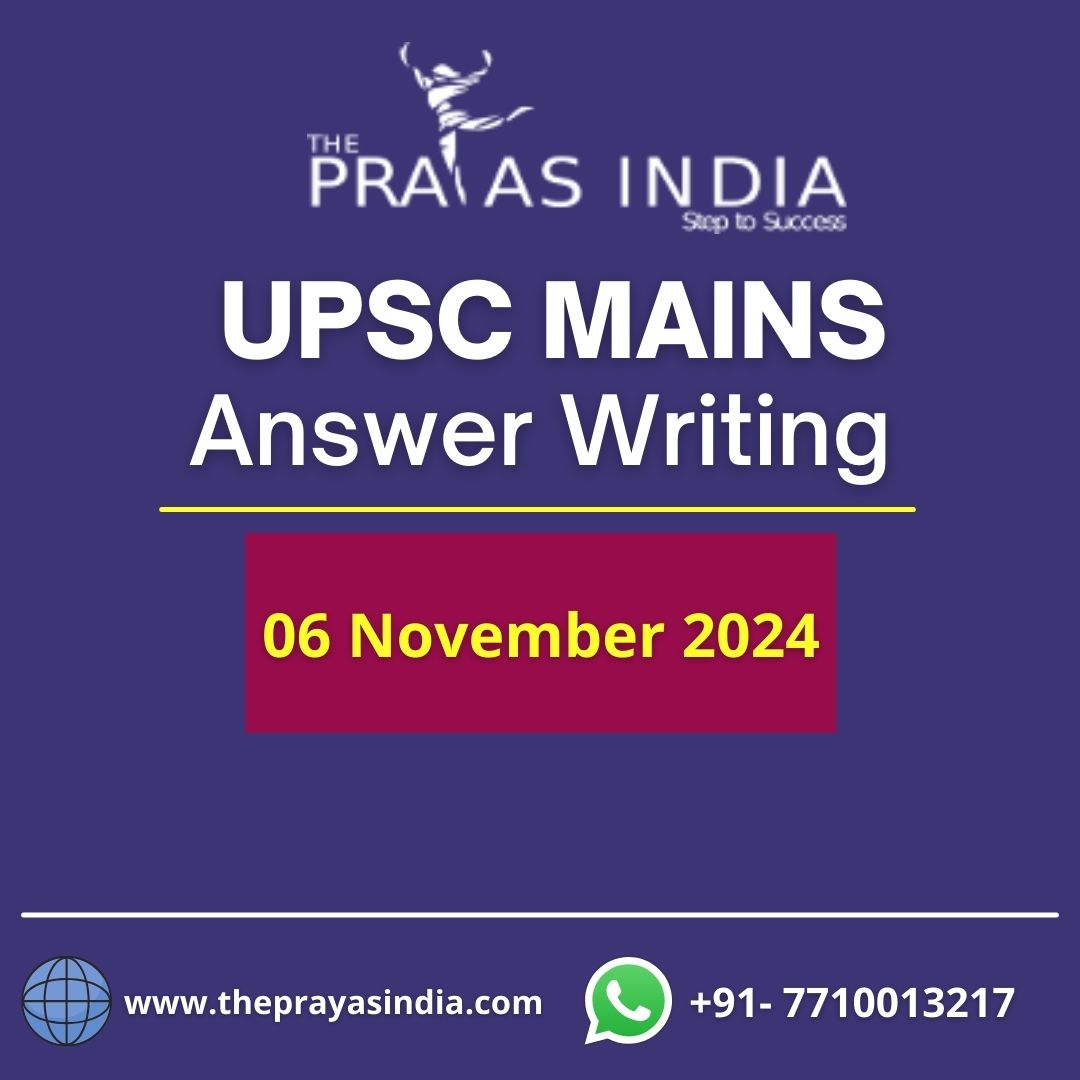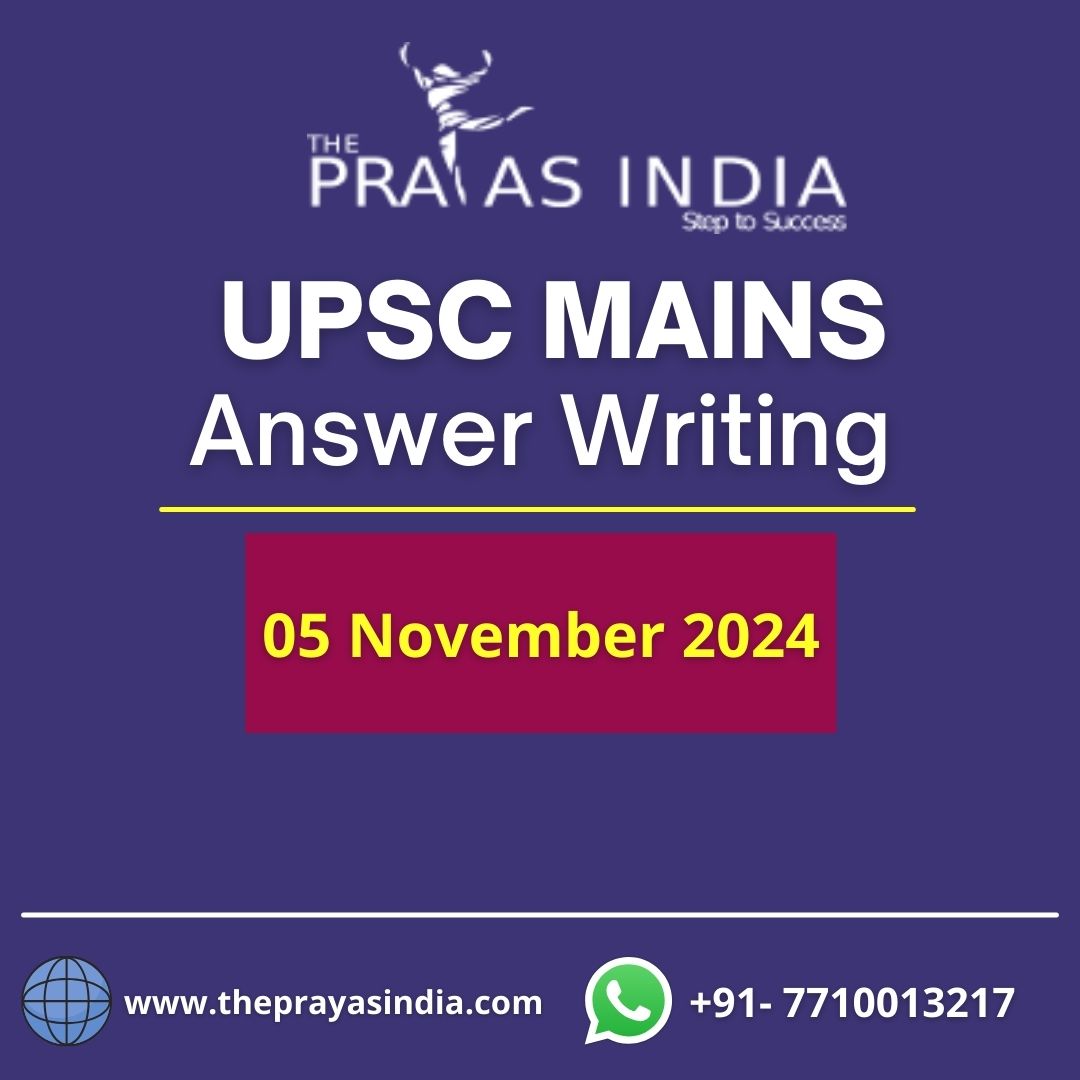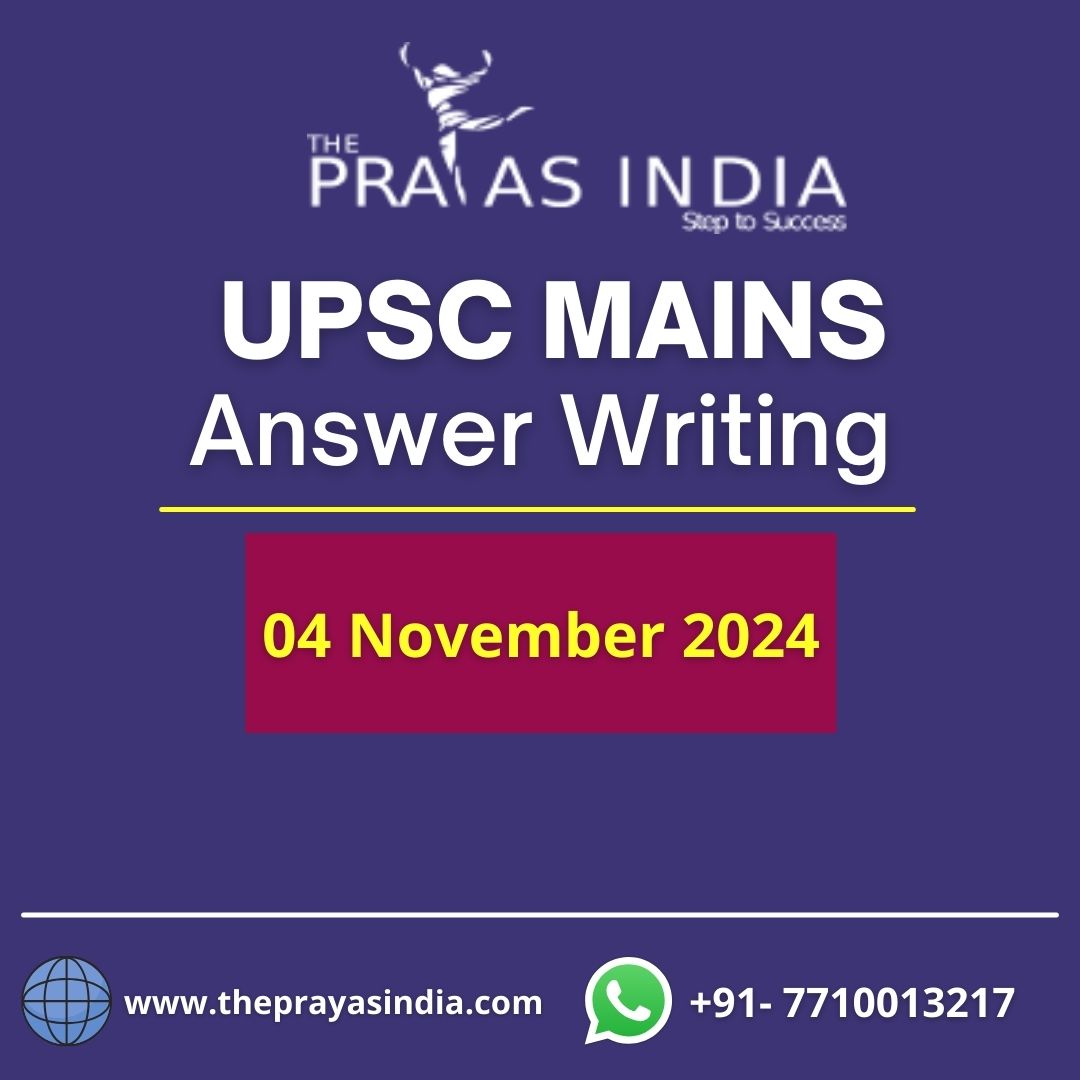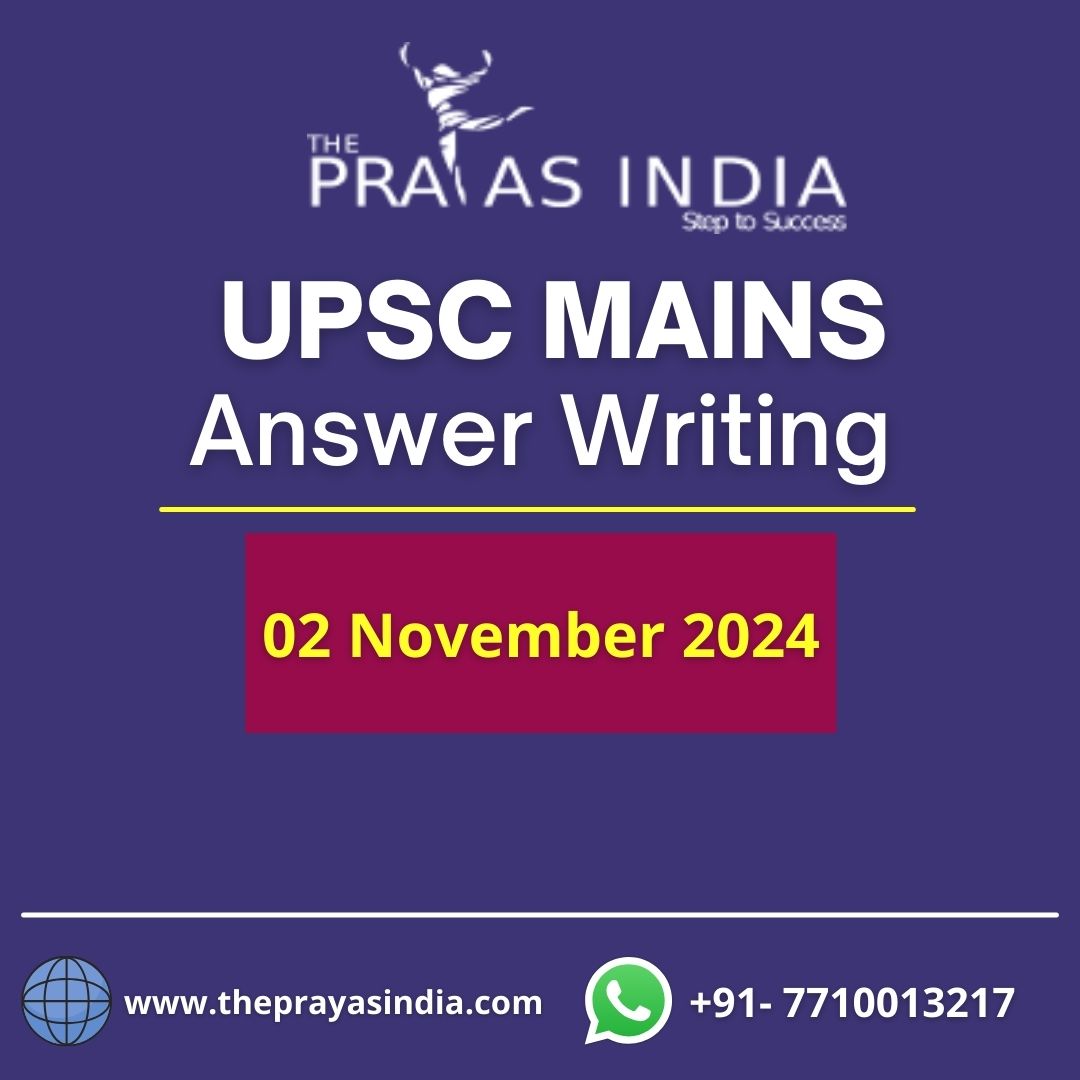MAINS QUESTIONS DAILY QUESTIONS & MODEL ANSWERS
Q1. Neither a different variety of communalism nor any other kind of communalism may be opposed. Consider how the many steps done to foster equality and fraternity in Indian society would affect your analysis of the assertion. (250 Words.)
Paper & Topic: GS II – Communalism related Issues
Model Answer:
Introduction:
Essentially, communism is a philosophy composed of three parts:
- a belief that people of like religions have common secular interests, such as like-minded political, economic, and social ones. Therefore, this is where socio-political communities begin to emerge.
- the notion that in a multireligious nation like India, one religion’s adherents have separate and distinct secular aims from those of adherents of another faith.
- The objectives of various religious communities or “groups” are seen as being entirely opposed, hostile, and unbridgeable.
Body:
Constitutionalism promoting equality and diversity:
- The concept of constitutionalism lends legitimacy to a democratic government. It should not, and cannot, be confused with the legitimacy of the measures conducted by the government. Constitutionalism is more significant than a written Constitution.
- Liberty, equality, and brotherhood served as the cornerstones of Ambedkar’s constitutionalism. He believed that fraternity was merely another name for democracy.
- Instead of being “merely a form of administration,” he claimed that democracy was “essentially an attitude of love and reverence towards fellowmen.”
Indian constitutional clauses promoting equality and brotherhood:
- According to Article 15, the state is not permitted to discriminate against anyone on the basis of their religion, caste, race, place of birth, or sex (1).
- The use of wells, tanks, bathing Ghats, roads, and public resorts that are fully or partially maintained with public funds or intended for the use of the general public, as well as the accessibility to stores, public dining establishments, hotels, and venues for public entertainment, shall not be subject to any disability, restriction, or condition. Article 15 states as much (2).
- The freedom of conscience, as well as the free practise, professing, and teaching of religion, are all included in Article 25. All persons are equally entitled to freedom of conscience and the right to freely profess, practise, and propagate a religion, subject to the laws of public order, morality, and health and other laws of this section.
- The freedom to participate in religious instruction or worship is guaranteed by Article 28 at several educational institutions.
- All Indian citizens have the rights to practise their religion, which are specified in Articles 25 through 28.
- Nonetheless, these essays are extremely up to date given the contemporary context of religious intolerance towards minorities.
- Article 30: Minorities have the freedom to establish and manage the educational institutions of their choice. In contrast to article 29, this article only applies to linguistic or religious minorities.
- The president may designate a special officer for minorities to conduct inquiries and perform other duties related to safeguarding the rights of linguistic minorities under Article 350-B, which was inserted to the Constitution.
What can be done to put an end to communalism?
Economic:
- Poverty is one of the key factors leading to intergroup conflict. Thus, initiatives to combat poverty are essential for promoting peace in communities.
- Eliminating young unemployment, illiteracy, and poverty while doing it openly and without discrimination.
- minimising the disadvantage minorities—like Muslims—face in terms of education and the economy.
- This can enhance their economical situation and minimise their deprivation compared to Hindus.
Social:
- Religious leaders and preachers should utilise religion to push sensible and practical concepts that promote security and peace.
- Textbooks and brochures must be distributed to pupils in schools in order to foster unity and respect for all religions.
- educating the people about the damaging impacts of communism through the media
Political:
- You should overlook the Supreme Court’s most recent decisions.
- maps showing where riots are likely to occur. For instance, the Delhi police used drones to watch and maintain vigil during communal celebrations.
- The impact of media, movies, and other cultural platforms can help to advance peace and harmony.
- Social media posts that are violent or offensive should be taken down immediately.
- Recommendations from the Committee on National Integration:
Community-wide celebrations of festivals:
Hindus were restrained as they paraded in front of the mosques:
- To prevent antisocial people from inciting riots in neighbourhoods, small communities of peace and fraternity should be developed.
- sensitivity to religious conventions, traditions, and practises.
Conclusion:
- Maintaining a sense of equality among its residents is actually important to give the term “democracy” meaning in a vast country like India that is made up of a multitude of cultures, ethnicities, beliefs, identities, etc. A rejection of differences is the fundamental cause of all prejudices. We frequently commit heinous crimes in an effort to exterminate those who follow different traditions. But this intolerance could push India towards becoming a sectarian state rather than a secular one. India is renowned for its “diversity” in the international community. It is nice when people can live in harmony despite their differences.
Q2. Startups can play a significant role in democratising and socialising healthcare access in India. Explain (250 words)
Paper & Topic: GS III – Indian Economy
Model Answer:
Introduction:
- Startups are becoming a valid and significant part of industry debates and actions due to the multiple challenges that the healthcare sector will face, including COVID.
Body:
Startups’ role in democratising and socialising healthcare access:
- Access to diagnostics at a fair price: Pharmeasy has reduced the cost of medical testing and made sampling locations reachable even in remote areas.
- The new applications of technology are causing telemedicine and telenursing to grow significantly.
- This has improved customer access to healthcare by lowering the effort and time needed to travel to doctors’ offices.
- This is a technique for giving rural communities access to affordable healthcare.
- medical equipment The cost of Covid testing used to be close to $2,000, but a Fast Antigen Test kit can now be bought for roughly $500.
- Cheap nutritionist: Customers receive recommendations for their diet and calorie intake on their cellphones based on AI. For example, HealthifyMe tracks calories consumed and provides recommendations for healthier recipes and lifestyle changes.
- Interpreting diagnostic results: Radiologists and nuclear medicine professionals are in low supply in Tier 2 cities and rural areas. These days, image processing-based interpretations frequently make use of AI and machine learning. The company’s flagship product, InstaECG, for instance, is a cloud-connected tool that helps with the interpretation and analysis of ECG signals in just 10 minutes.
Moving ahead:
- There is an urgent need to provide accessible, cheap health care to the general public given the socioeconomic status, geographic location, and availability of skilled labour.
- In order to assist entrepreneurs, the government has taken a number of actions, such as cutting the cost of filing patents, easing the regulations controlling public procurement, establishing a fund of funds, and enacting a seed fund programme. This requires more development.
- With greater incentives to encourage more innovation and development, healthcare might be included in Made in India and Startup India.
Conclusion:
- Innovations in the healthcare sector have historically involved startups. It is crucial that they stay included in the conversation and that we aid smaller, more nimble businesses in their quest to innovate. The startup’s guiding principle is to constantly reevaluate and embrace their disruptive nature in order to challenge norms and pursue more efficient and superior outcomes. This needs to be nurtured by governmental programmes.




